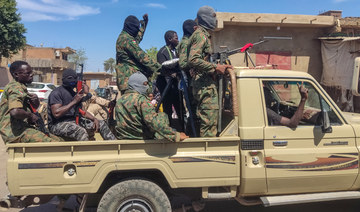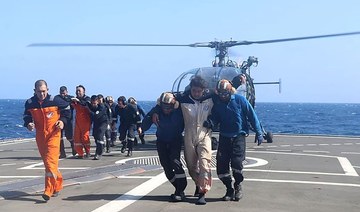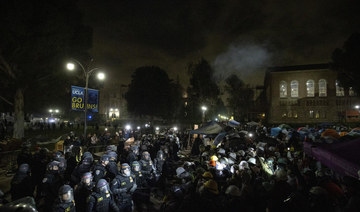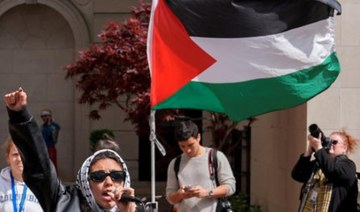KFAR YUVAL, Israel: For years, public service announcements warned Israelis to save water: Take shorter showers. Plant resilient gardens. Conserve. Then Israel invested heavily in desalination technology and professed to have solved the problem by tapping into the abundant waters of the Mediterranean Sea. The once ubiquitous conservation warnings vanished.
Now, a five-year drought is challenging that strategy, as farmers struggle and the country’s most important bodies of water shrink.
It’s a confounding situation for a country that places itself on the forefront of desalination technology in an arid region, where water is a key geostrategic issue that has its own clauses in peace agreements.
“Nobody expected five years of drought in a row, so despite our desalination capacity, it’s still a very, very grave situation,” said Yuval Steinitz, Israel’s minister of energy.
Some say Israel’s technological prowess may not be enough to overcome the forces of nature.
Situated in the heart of the Middle East, Israel is in one of the driest regions on earth, traditionally relying on a short rainy season each winter to replenish its limited supplies.
Years of decreased rainfall have reduced the Sea of Galilee, Israel’s main natural water source, to some of its lowest recorded levels, and Israel has stopped pumping water from it to its national system.
The current drought has also dried out some tributaries that feed into the Jordan River, which flows south into the Sea of Galilee then squiggles 220 miles (360 kilometers) to the lowest place on Earth, the Dead Sea.
The biblical bodies of water are crucial to the survival and stability of Israel, Jordan and the Palestinian territories, but they are increasingly drying up, largely due to climate change, growing populations and the greater use of water for agriculture.
In a bid to achieve water security, Israel has opened five desalination plants since 2005 and plans to expand that effort in the coming years. Roughly 40 percent of Israel’s drinking-quality water now comes from desalination and is expected to hit 70 percent in 2050.
When the drought was in its infancy, Israel greeted it with a shrug, pointing to its massive investment in desalination. But the tone has changed recently, and over the last few months a televised ad again has pleaded with Israelis to save water because — rehashing a tagline from previous campaigns — “Israel is drying up.”
Critics say water conservation — a crucial measure in semi-arid Israel — has been sidelined in favor of desalination.
“Israel definitely put conservation on the backburner. As soon as desalination plants were up and running there was this false sense of security,” and water consumption rose, said Sarit Caspi-Oron, director of the water department at the Israel Union for Environmental Defense, an advocacy group.
“Desalination doesn’t make up for everything, and when groundwater is suffering from drought and the Sea of Galilee is suffering from drought, you need to conserve,” said Caspi-Oron.
In the past, Israel has imposed taxes on water use during droughts and has promoted the use of water-saving devices. But there are no plans so far to pursue the measures this time around.
Desalinated water reaches Israeli households in the country’s most populated region along the coast as well as some inland residents. But in northern Israel, residents still rely on rapidly shrinking natural sources. So far, their intake has not been limited.
Once bubbling brooks in Israel’s north have been reduced to a trickle. Officials at the historic Tel Dan nature reserve say the springs there will be dry within two months, which could negatively affect tourism in the region.
Among the first to feel the drought’s sting have been farmers in Israel’s Galilee region. Israel has imposed a limit on the amount of water they can use, which has threatened an already tenuous livelihood and forced many to rethink their crops.
Israeli farmer Ofer Moskovitz can typically grow more than one crop each year, but for the first time he has chosen not to plant his wheat crops and is only growing avocados. Even that change is proving a challenge.
“If I don’t water the avocado trees for one day they start getting weak. If I don’t water them for a year, 20 years would go down the drain,” he said.
The existing infrastructure makes it impossible to deliver desalinated water to farmers in the north, said Caspi-Oron.
There are other reasons not to bank on desalination. The plants require immense amounts of energy and are costly to build and operate. Relying so heavily on desalination also creates a potential security risk, as an attack on the plants could potentially knock out large portions of the country’s water supply.
Still, Israel is keeping the technology a priority. The government passed a plan in June to tackle the drought, with its first objective to increase the amount of desalinated water. It also called for springs and tributaries to be rehabilitated and plans to add desalinated water to the Sea of Galilee starting next year, despite criticism from some that this could disturb the balance of minerals in the lake.
Israel is optimistic that the drought can be addressed with a little ingenuity.
The drought “will be solved, there is no question,” Steinitz, the energy minister, said. “This area is not new for us. We simply resume our historic tradition to focus and find developing water solutions.”
5-year drought raises questions over Israel’s water strategy
5-year drought raises questions over Israel’s water strategy
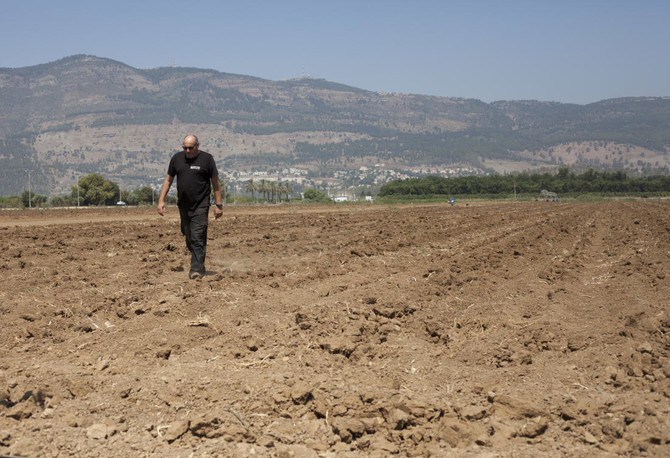
- It’s a confounding situation for a country that places itself on the forefront of desalination technology in an arid region
- The current drought has also dried out some tributaries that feed into the Jordan River
Palestinian groups say top Gaza surgeon died in Israeli custody
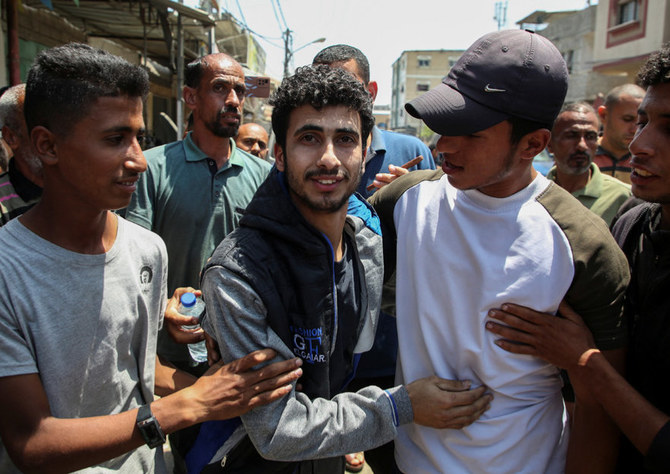
- Dr. Adnan Ahmed Atiya Al-Barsh died at the Israeli-run Ofer prison in the West Bank last month: advocacy groups
- Latest deaths brought to 18 the number of deaths in Israeli custody since the war began on October 7, groups said
RAMALLAH, Palestinian Territories: Palestinian advocacy groups said Thursday that the head of orthopedics at Gaza’s largest hospital Al-Shifa has died in Israeli custody, alleging he had been tortured during his detention.
Dr. Adnan Ahmed Atiya Al-Barsh died at the Israeli-run Ofer prison in the occupied West Bank last month, the Palestinian Prisoners Affairs Committee and the Palestinian Prisoners Club said in a joint statement.
Contacted by AFP about the reported death in custody, the Israeli army said: “We are currently not aware of such (an) incident.”
Barsh, 50, had been arrested with a group of other doctors last December at Al-Awda Hospital near the Jabalia refugee camp in northern Gaza.
He died on April 19, the prisoners groups said, citing Palestinian authorities.
“His body is still being held,” they added.
The groups said they had also learnt that another prisoner from Gaza, Ismail Abdel Bari Rajab Khadir, 33, had died in Israeli custody.
Khadir’s body was returned to Gaza on Thursday, as part of a routine repatriation of detainees by the army through the Kerem Shalom border crossing, the groups said, citing authorities on the Palestinian side of the crossing.
The groups said evidence suggested the two men had died “as a result of torture.”
They alleged that Barsh’s death was “part of a systematic targeting of doctors and the health system in Gaza.”
The health ministry in Hamas-ruled Gaza said the surgeon’s death amounted to “murder,” adding that it brought to 492 the number of health workers killed in Gaza since the war erupted nearly seven months ago.
The prisoners groups said the latest deaths brought to 18 the number of deaths in Israeli custody since the war began on October 7.
There have been repeated Israeli military operations around Gaza’s hospitals that have caused heavy damage.
Medical facilities are protected under international humanitarian law but the Israeli military has accused Hamas of using Gaza’s hospitals as cover for military operations, something the militant group denies.
The Al-Shifa hospital, where Barsh worked, has been reduced to rubble by repeated Israeli military operations, leaving what the World Health Organization described last month as an “empty shell.”
The war started with an unprecedented Hamas attack on southern Israel that resulted in the deaths of 1,170 people, mostly civilians, according to an AFP tally of Israeli official figures.
Israel estimates that 129 captives seized by militants during their attack remain in Gaza. The military says 34 of them are dead.
Israel’s retaliatory offensive against Hamas, has killed at least 34,596 people in Gaza, most of them women and children, according to the health ministry.
Lebanon urged to conclude working arrangement with EU border agency to prevent illegal migration
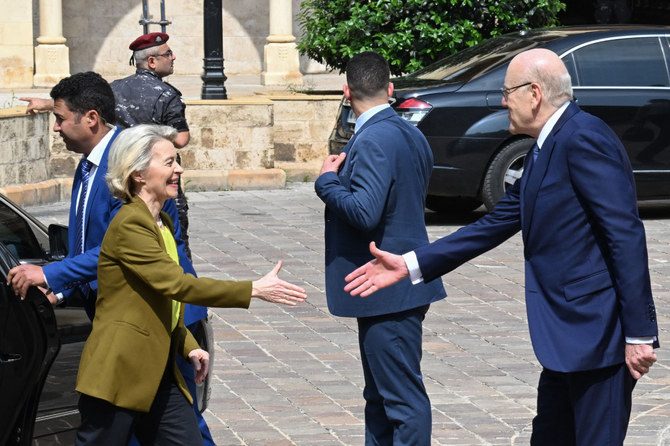
- Berri: Lebanon ready to discuss implementation of UN Resolution 1701 after Gaza aggression ends
- The EU assistance is tied to Lebanon’s need to implement the required reforms and control its borders and illegal crossings with Syria
BEIRUT: The EU has announced an aid package for Lebanon of 1 billion euros ($1.06 billion) to help boost border control and halt the flow of asylum-seekers and migrants from the country across the Mediterranean Sea to Cyprus and Italy.
It comes against a backdrop of increasing hostility toward Syrian refugees in Lebanon and a major surge in irregular migration of Syrians from Lebanon to Cyprus.
The UN High Commissioner for Refugees, meanwhile, has decided to reduce healthcare coverage for registered Syrian refugees by 50 percent.
EU Commission President Ursula von der Leyen said during her visit to Beirut with Cypriot President Nikos Christodoulides that they hoped Lebanon would conclude a “working arrangement” with Frontex, the EU’s border agency.
Von der Leyen said the aid’s distribution will start this year and continue until 2027.
The aid will be dedicated to the most vulnerable people, including refugees, internally displaced people, and host communities.
The EU assistance — which is tied to Lebanon’s need to implement the required reforms and control its borders and illegal crossings with Syria — came in the wake of continued hostilities on the southern front between Hezbollah and the Israeli military.
The two officials arrived in Beirut following the European Council’s special meeting last month.
At the end of the meeting, the council confirmed the EU’s “determination to support the most vulnerable people in Lebanon, strengthen its support to the Lebanese Armed Forces, and combat human trafficking and smuggling.”
It also reaffirmed “the need to achieve conditions for safe, voluntary and dignified return of Syrian refugees, as defined by UNHCR.”
The visit lasted hours in Lebanon and included a meeting with caretaker Prime Minister Najib Mikati and Parliament Speaker Nabih Berri.
Following a tripartite meeting and an expanded discussion in which ministers and security officials participated, Mikati commended the EU’s understanding of the Lebanese state’s demand to reconsider some of its policies regarding assistance to Syrian refugees in the country.
Mikati said: “Lebanon has borne the greatest burden, but it can no longer endure the current situation, especially since the refugees constitute around one-third of Lebanon’s population, which results in additional difficulties and challenges and exacerbates Lebanon’s economic crisis.”
He added: “What is more dangerous is the escalating tension between Syrian refugees and the Lebanese host community due to the crimes that are increasing and threatening national security.”
Mikati emphasized that “Lebanon’s security is security for European countries and vice versa,” adding that “our cooperation on this matter constitutes the real entry point for stability.”
He added: “We refuse to let our country become an alternative homeland, and everyone knows that the solution is political excellence.”
Mikati called for the EU and international actors to recognize that most Syrian areas have become safe, which would facilitate the refugees’ repatriation and allow them to be supported in their home country.
As a first step, those who entered Lebanon in 2016 must go back, as most of them fled for economic reasons and are not considered refugees, said Mikati.
He warned against “turning Lebanon into a transit country to Europe,” saying that “the problems occurring on the Cypriot border are a sample of what might happen if the matter was not radically addressed.”
Von der Leyen, the first European Commission president to visit Lebanon, affirmed her “understanding of the Lebanese position.”
She said: “We want to contribute to Lebanon’s socio-economic stability by strengthening basic services and investments in, for example, education, social protection, and health for the people of Lebanon.
“We will accompany you as you take forward economic, financial, and banking reforms.
“These reforms are key to improving the country’s long-term economic situation. This would allow the business environment and the banking sector to regain the international community’s trust and thus enable private sector investment.”
The EU official said that the support program for the Lebanese military and other security forces “will mainly focus on providing equipment, training and the necessary infrastructure for border management.
“In addition, it would be very helpful for Lebanon to conclude a working arrangement with Frontex, particularly on information exchange and situational awareness.”
She continued: “To help you manage migration, we are committed to maintaining legal pathways open to Europe and resettling refugees from Lebanon to the EU.
“At the same time, we count on your cooperation to prevent illegal migration and combat migrant smuggling.”
Von der Leyen said: “We will also look at how we can make the EU’s assistance more effective. This includes exploring how to work on a more structured approach to voluntary returns to Syria, in close cooperation with UNHCR.”
She also stressed that the international community should strengthen support for humanitarian and early recovery programs in Syria.
Von der Leyen added: “We are deeply concerned about the volatile situation in southern Lebanon, and believe that the security of both Lebanon and Israel cannot be disassociated.
“So, we call for the full implementation of UN Security Council Resolution 1701.
“This needs to be part of a negotiated diplomatic settlement. The Lebanese armed forces are critical here, too, and the EU is ready to work on bolstering their capabilities.”
Christodoulides said that European assistance, which also includes “combating smuggling and managing borders and monitoring them,“ would “enhance the Lebanese authorities’ ability to confront various challenges such as monitoring land and sea borders, ensuring the safety of citizens, combating human trafficking, and continuing counterterrorism efforts.”
The Cypriot president said the “reverberations of the issues and challenges” that Lebanon was facing directly affected Cyprus and the EU.
“We need to work with our partners and UNHCR to discuss the issue of voluntary returns and reconsider the situation of some areas in Syria.”
He emphasized that Lebanon must implement the “necessary and deep reforms in line with the International Monetary Fund’s demands and address issues of accountability, and Cyprus will support Lebanon’s efforts to elect a new president, a development that will send a strong political and symbolic message for change and moving forward.”
Parliament Speaker Berri told the European official that Lebanon “does not want war, and since the moment the Israeli aggression began, it has remained committed to the rules of engagement, which Israel continues to violate, targeting the depth of Lebanon, not sparing civilians, media personnel, agricultural areas, and ambulances, using internationally banned weapons.”
Berri said that Lebanon, “while awaiting the success of international efforts to stop the aggression on the Gaza Strip, which will inevitably reflect on Lebanon and the region, will then be ready to continue the discussion on the implementation of UN Resolution 1701, to which Lebanon was and still is committed and adheres.”
Berri urged “the concerned parties to engage with the Syrian government, which now has a presence over most of its territories, in addressing the refugee issue.”
Red Cross says gunmen kill two of its drivers in Sudan
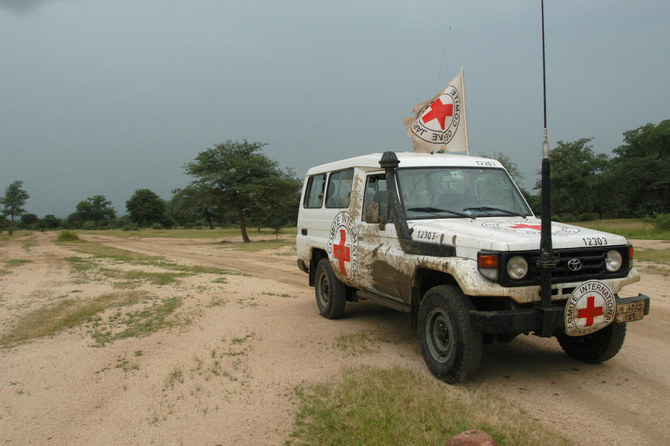
- The team was on its way back from Layba to assess the humanitarian situation of communities affected by armed violence
- “We are in deep mourning for our dear colleagues,” said Pierre Dorbes, head of the ICRC delegation in Sudan
GEENVA: Gunmen killed two drivers working for the International Committee of the Red Cross in war-torn Sudan on Thursday and injured three other staff, the ICRC said.
“The team was on its way back from Layba to assess the humanitarian situation of communities affected by armed violence in the region when the incident occurred” in South Darfur, the ICRC said in a statement.
“We are in deep mourning for our dear colleagues. We extend our sincere condolences to their families, and we hope for a speedy recovery for our injured co-workers,” said Pierre Dorbes, head of the ICRC delegation in Sudan.
A brutal conflict between the Sudanese army led by General Abdel Fattah Al-Burhan and the paramilitary Rapid Support Forces of his ex-deputy Mohamed Hamdan Dagalo has torn the country apart for more than a year.
The war has killed tens of thousands of people and forced millions more to flee their homes in what the United Nations has called the “largest displacement crisis in the world.”
It has also triggered acute food shortages and a humanitarian crisis that has left the northeast African country’s people at risk of starvation.
Houthi leader vows ‘fourth phase’ of Red Sea ship attacks
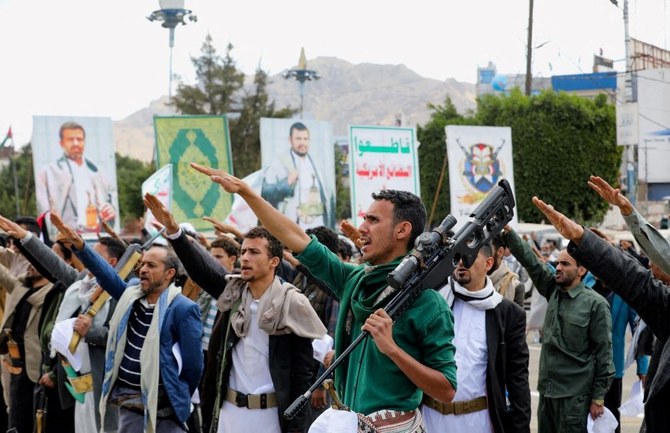
- Abdul Malik Al-Houthi: ‘We are preparing for a fourth round of escalation if the Israeli enemy and the Americans continue their intransigence’
- Al-Houthi said that 452 attacks by US and UK armies on militia-controlled regions had killed 40 people and injured 35 others since January
AL-MUKALLA: The leader of the Houthi militia vowed to escalate attacks on ships in the Red Sea until Israel ends its war in Gaza and the US stops attacking Yemen.
“We are preparing for a fourth round of escalation if the Israeli enemy and the Americans continue their intransigence,” Abdul Malik Al-Houthi said in a televised speech on Thursday.
Al-Houthi said that his forces launched 606 ballistic missiles and drones against 107 Israeli, US, and UK ships in the Red Sea, Bab Al-Mandab Strait, Gulf of Aden, and recently in the Indian Ocean during the Red Sea ship campaign that began in November.
In the last seven days alone, the Houthis have fired 33 ballistic missiles and drones at six ships in international seas off Yemen’s coast, as well as Israel’s city of Eilat.
Al-Houthi said that 452 attacks by US and UK armies on militia-controlled regions had killed 40 people and injured 35 others since January.
His warning came after the militia’s media said on Thursday that the US and UK carried out five airstrikes on Hodeidah airport in the Red Sea’s western city of Hodeidah.
On Tuesday, the US carried out another strike on the port of Al-Saleef in Hodeidah after the US Central Command reported its troops stopped a Houthi assault with a drone boat on the same day.
The Houthis have seized a commercial ship, sunk another, and launched hundreds of missiles and drones at international navy and commercial ships in the Red Sea since November, claiming to be in support of Palestinians and pressuring Israel to cease its war in Gaza.
As a response to the attacks, the US formed a coalition of marine forces to protect the Red Sea.
It also launched strikes on Houthi targets in Sanaa, Saada, Hodeidah, and other Yemeni areas controlled by the Houthis.
Turkiye’s Erdogan criticizes US crackdown on college protests
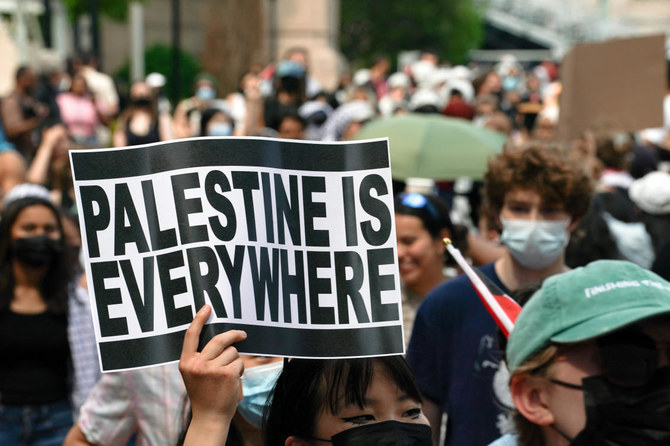
- “Conscientious students and academics including anti-Zionist Jews at some prestigious American universities are protesting the massacre (in Gaza),” Erdogan told an event
- “These people are being subjected to violence, cruelty, suffering, and even torture for saying the massacre has to stop“
ANKARA: Turkish President Tayyip Erdogan waded into the debate over US college campus protests on Thursday, saying authorities were displaying “cruelty” in clamping down on pro-Palestinian students and academics.
Demonstrations have spread on campuses across the United States over Israel’s conduct of the war in Gaza, prompting police crackdowns and arrests at some venues such as Columbia University in New York.
“Conscientious students and academics including anti-Zionist Jews at some prestigious American universities are protesting the massacre (in Gaza),” Erdogan told an event in Ankara.
“These people are being subjected to violence, cruelty, suffering, and even torture for saying the massacre has to stop,” he said, adding that university staff were being “sacked and lynched” for supporting the Palestinians.
Turkiye, a NATO ally of the United States, has sharply criticized Israel’s assault on Gaza and what it calls the unconditional support it receives from Western countries.
The US is a top supplier of military aid to Israel and has shielded the country from critical United Nations votes.
“The limits of Western democracy are drawn by Israel’s interests,” Erdogan said. “Whatever infringes on Israel’s interests is anti-democratic, antisemitic for them.”
More than 34,000 people have been killed in Gaza during Israel’s nearly seven-month military offensive, Palestinian health officials say, after Hamas militants killed some 1,200 people and took 253 hostages during an Oct. 7 assault on southern Israel, according to Israeli tallies.








